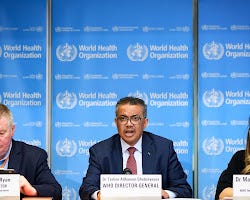
The World Health Organization (WHO) has declared monkeypox a global health emergency, marking the first time that the organization has issued such a declaration for a monkeypox outbreak. The decision comes in response to a recent surge in monkeypox cases across several African countries, including Nigeria and the Central African Republic.
Monkeypox is a rare viral disease that is similar to smallpox, but generally less severe. The disease is transmitted to humans through contact with infected animals, such as rodents or primates, or through contact with bodily fluids from infected humans.
While monkeypox is generally considered to be a rare disease, recent outbreaks in several African countries have raised concerns about its potential to spread more widely. The WHO’s declaration of a global health emergency is intended to help raise awareness of the disease and to mobilize resources to help prevent its spread.
The declaration of a global health emergency is also expected to help focus international attention on the need to develop effective treatments and vaccines for monkeypox. While there are currently no specific treatments or vaccines available for the disease, researchers are working to develop new therapies that could help to prevent and treat monkeypox infections.
Overall, the WHO’s declaration of a global health emergency for monkeypox highlights the growing importance of global health security and the need for international cooperation to address emerging infectious diseases. As the world becomes increasingly interconnected, it is likely that we will continue to see new and emerging diseases that pose a threat to global health, making it more important than ever to work together to prevent and control these outbreaks.
No comments:
Post a Comment
Welcome to Leave a Comment